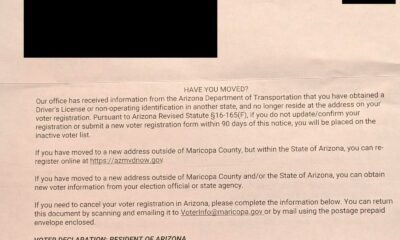Business
Pima County Leaders Tackle Urgent Housing Crisis in Tucson Area

Pima County Administrator Jan Lesher is set to brief the Board of Supervisors on strategies to address the housing and homelessness crisis in the region. The update will occur during the board’s regular meeting on Tuesday, amidst ongoing discussions by a community panel focused on long-term solutions to the issue. The Supervisors chose to postpone conversations about potential funding until the panel’s evaluation is complete, signaling that immediate policy changes are unlikely.
The county’s approach to this multifaceted problem focuses primarily on two objectives: preventing homelessness and assisting those currently experiencing it. Currently, $6 million per year is allocated to eviction diversion and tenant legal services, a substantial increase from the nearly $1 million available annually during the Great Recession. Additionally, $1.4 million has been earmarked for rental assistance, with a similar amount dedicated to housing case management.
Efforts also extend to individuals living on the streets, with Pima County investing $3.5 million in shelters and rehousing services. To expedite housing for those newly displaced, the county has allocated $1 million for rapid rehousing initiatives.
In total, Pima County’s commitment to combating homelessness amounts to $17 million, with the Supervisors expressing a desire to secure an additional $10 million for further support. Unlike cities, counties typically shoulder the responsibility for welfare and social services, as they are subdivisions of the state.
Tucson is also enhancing its social services framework while exploring ways to increase housing availability. Building more homes in surrounding areas may alleviate some pressure, but the focal point remains Midtown, where the need is greatest. High-density residential developments within the urban core, served by existing infrastructure, tend to be more affordable and practical for lower-income individuals.
The City Council is examining zoning adjustments to promote higher density housing, which could address housing shortages effectively. In related matters, the Pima County Supervisors are expected to approve a lease with Accelerate Diagnostics, a local biotech firm, during this week’s meeting.
Accelerate Diagnostics, located in the county’s Abrams Building since 2012, employs 96 individuals and aims to add 19 more positions with competitive salaries averaging $100,000 annually. The county will lease 52,000 square feet of property to the firm at a monthly rate of slightly over $63,000, significantly below the market rate, which hovers around $20 per square foot.
A third-party appraiser verified the lease value, and if the new positions contribute $37,000 monthly to the local tax base, the county could break even on this deal. Projections from Sun Corridor Inc., the region’s economic development program, anticipate that Accelerate Diagnostics will generate approximately $374.4 million during the five-year lease term.
On a different note, the Oro Valley Town Council plans to vote on renaming West Lambert Lane Park in celebration of its 50-year incorporation milestone. The park, featuring quarter and half-mile hiking trails, initiated the renaming process through summer camp participants aged 6 to 13 from Steam Pump Ranch. Their suggestions were refined by the Youth Advisory Council and later evaluated by the Parks and Recreation Advisory Board.
Potential new names include Golden Peak Trails, Panorama Trails, and Golden Peak Loop, with the youth council’s favorites being Panorama Trails, Golden Peak, and Sky Island Trails. While opinions vary on these choices, the renaming process reflects community engagement and the significance of the park’s legacy.

















